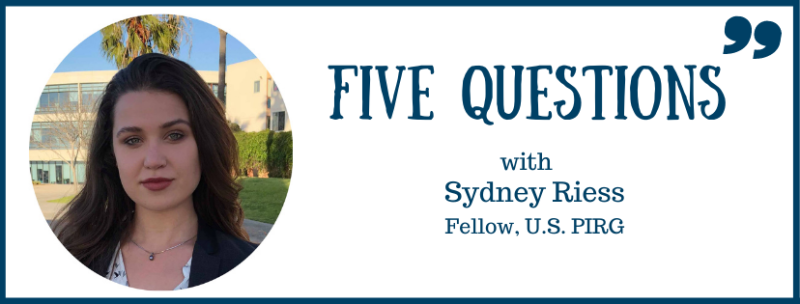5 Questions: Sydney Riess, U.S. PIRG
Will you tell us about yourself and how you came to the U.S. PIRG?
I remember walking into my first university lecture, a class titled "The Demise of Western Civilization" with a skateboarding microbiology professor just as dramatic as the title of his course. Despite the pessimism of the title, the course was a critical but hopeful look at current events and activism. Trying to find the root of systemic issues was like unraveling the world’s worst kept ball of yarn, but I was hooked. That course lit a fire, I wanted to solve problems, motivate action, and elevate the voices of experts above the noise of misinformation. Four years later, I found a place to do just that at U.S. PIRG!
What motivated U.S. PIRG to begin advocating for reforming the way antibiotics are used in food animal production?
Our antibiotics campaigns represent a quintessential U.S. PIRG campaign. Keeping antibiotics viable is a crucial public health issue with many clear impactful solutions, but right now progress is being blocked by corporate interest. Medically important antibiotics represent a cornerstone of modern medicine that food animal producers are irresponsibly using to further their bottom line. Our job is to challenge corporate interests, fight for public health, and save lives.
Over the last six years, U.S. PIRG has done just that. With help from our Antibiotics off the Menu coalition partners we have called on fast food companies — some of the largest meat buyers in the country — to stop sourcing meat raised with routine antibiotic use. Now, over half of the top twenty-five fast-food chains, including McDonald’s, KFC, and Wendy’s, no longer serve chicken raised with the routine use of medically important antibiotics.
How will U.S. PIRG be using these successes to move forward in antibiotics work?
U.S. PIRG is turning its focus to the beef industry, which accounts for more medically important antibiotics than any other U.S. meat sector. But the core message is the same, the overconsumption of medically important antibiotics is short-sighted and unsustainable. This practice emerges from the faulty logic that bigger is better and corporate profit is more valuable than human life. Cheap meat is not worth the cost of losing effective antibiotics.
Can you tell us about your work with CCCAS? What is your role and what does the group do? How do interested parties join?
Working with our CCCAS physicians has been one of my favorite parts of the job! These folks see the impact that antibiotic resistance has on human medicine and have been moved to action. They work on the hospital level to improve food supply chains, bring their expertise to the media, and support relevant legislation. It is a community where we celebrate individual successes and help to build partnerships across the nation to encourage change.
My role is to help facilitate and celebrate success across our coalition. I am equal parts a director of resources and cheerleader for the team! If you are interested in joining our amazing network of clinicians you can apply at www.preserveantibiotics.org.
When it comes to antibiotic resistance, what freaks you out? What gives you hope?
I often fear that antibiotic resistance suffers from a lack of visibility. In many cases, antibiotic resistant illness is a silent killer that is chalked up to a freak accident. Unfortunately, solutions for this imperative public health issue have been shrouded by a lack of transparency. That combination creates the perfect breeding ground for corporate interest to take priority over public health. It is a scary prospect but makes our advocacy work at U.S. PIRG that much more important.
Every day I get to work with people who have committed their careers or donated their spare time to keeping antibiotics viable. There are so many smart and passionate individuals working to reimagine the way we use antibiotics. I firmly believe we have the solutions, the passion, and the power to make lasting change. And that gives me hope!


